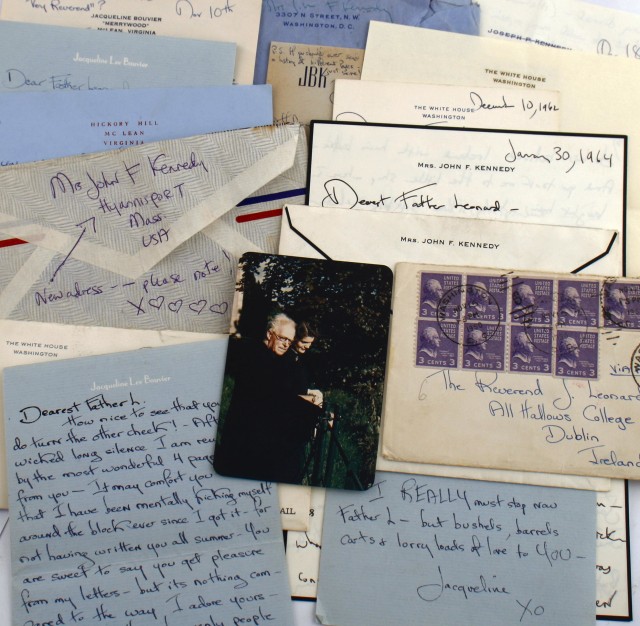Jacqueline
Kennedy confided intimate thoughts to an Irish priest about her entire
romance with John F. Kennedy, from the excitement of first love to an
assassination that left her “bitter against God.”
“God
will have some explaining to do to me if I ever see him,” the
devastated first lady wrote to the priest in 1964 after her president
husband was gunned down. “I have to think there is a God — or I have no
hope of finding Jack again.”
The future Mrs. Kennedy
began writing to the priest, Rev. Joseph Leonard, after meeting him on a
visit to Ireland in 1950, when she was 21.
Over the next 14 years,
in a neat, back-slanting hand, she wrote of dating and marriage and of
her ultimate heartbreak. She wrote freely of how she felt, a departure
from the controlled image of previously released letters and books.
The letters, previously unpublished, number 33 in all. They will be sold in June by Sheppard’s auction house of Ireland. Excerpts were published Tuesday by the Irish Times newspaper. They are expected to fetch as much as $1.6 million.
The auction house said Tuesday that the letters amount to “the unpublished autobiography of Jacqueline Bouvier Kennedy.”
“What
comes though from the letters is Jacqueline’s obvious love for Ireland,
which pre-dated her engagement and marriage to John F. Kennedy,” said
the auctioneer, Philip Sheppard. “But there’s also wonderful insight
into their courtship and into the character of the man who would become
president.”

Sheppard's Irish Auction House
In July 1952, when Kennedy
was a third-term congressman and a rising political star, Bouvier wrote
of being in love with “the son of the ambassador to England.” She had
written of a previous love, an engagement that was broken off.
Of
John F. Kennedy, she wrote: “He’s like my father in a way — loves the
chase and is bored with the conquest — and once married needs proof he’s
still attractive, so flirts with other women and resents you. I saw how
that nearly killed Mummy.”
The
Kennedys married in 1953. After a year, Mrs. Kennedy wrote: “I love
being married much more than I did even in the beginning.”
In
1956, after a daughter was stillborn, Jacqueline Kennedy wrote to the
priest that she could see “so many good things that come out of this —
how sadness shared brings married people closer together.”
Leonard died in 1964. Kennedy married the shipping magnate Aristotle Onassis after the president’s death. She died in 1994.
Besides the 33 letters,
the auction house will put on the block Christmas cards, photographs
and newspaper clippings shared between Mrs. Kennedy and the priest.
In
the letters, she spoke in detail of her feelings about Catholicism. She
wrote in 1952 that she and her sister had been away from church for a
year but desperately wanted to “get close to God again.”
The
Irish father, she wrote, was “someone who loves everything I love — who
you can have FUN with — who can take you to Jammet’s & the theatre
as naturally as to Mass — whom you can talk to about anything in the
world and know you won’t shock them — and whose whole life is built on
love — love and not fear — which is what always put me off.”
The
two also regularly exchanged books. She thanked him for a gift, for
Christmas 1962, of “My Ireland,” by Kate O’Brien. She signed her letters
with Xs and Os. She introduced the priest to her husband, by then a
U.S. senator, in 1955, the Irish Times reported.
Mrs.
Kennedy wrote in a January 1964 letter that she was “so bitter against
God” but confided that “only He and you and I know that.” She wrote that
she was trying to make peace with God, and did not want to raise her
children in bitterness.
The letter arrived on black-lined mourning paper, embossed “Mrs. John F. Kennedy.”
A
few weeks later, she wrote again to thank the priest for his prayers —
he had celebrated Mass for the late president — and to agree with his
previously expressed sentiment that “the American people are beginning
to realize what they have lost.”
“I feel more cruelly every day what I have lost,” she wrote. “I always would have rather lost my life than lost Jack.”
No hay comentarios:
Publicar un comentario